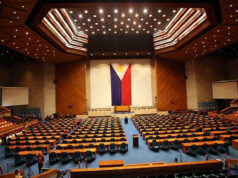Lockdowns should be ‘last resort,’ says Chua
THE government’s move to ease lockdown restrictions and further reopen the economy will likely boost growth this quarter, Acting Socioeconomic Planning Secretary Karl Kendrick T. Chua said.
In a speech before the 58th Philippine Economic Society Annual Meeting and Conference on Monday, Mr. Chua said strict lockdowns should be the “last resort” in the fight against the coronavirus disease 2019 (COVID-19).
To help the economy recover, he said the economic team had recommended to the Inter-Agency Task Force for the Management of Emerging Infectious Diseases shift its policy “from total risk avoidance to risk management.”
“We proposed, and this was accepted, to consider escalation of quarantine level only as a last resort. So if COVID-19 cases are rising, we will still maintain the current quarantine level and implement stricter protocols, or more localized quarantine instead of putting an entire region or province in quarantine,” Mr. Chua said.
Nearly all economic activity was halted during the strictest form of lockdown from mid-March to May, pushing the Philippines into its first recession in nearly 30 years. Official data released on Monday showed the economy shrank faster than expected in the second quarter to -16.9% from the previous estimate of -16.5%.
Mr. Chua said the economic team’s recommendations included increasing the capacity of mass transportation, allowing businesses to run at 100% capacity, boosting health systems, shortening curfew hours, and adopting localized quarantines if COVID-19 cases spike.
“Hopefully with the changes that you are seeing in the last quarter, these (looser restrictions) will have a better impact on our fourth-quarter GDP (gross domestic product) growth,” Mr. Chua said.
Former Socioeconomic Planning Secretary Ernesto M. Pernia, who stepped down from his post in April, said the government should spend more to pump-prime the economy.
“On fiscal stimulus, it should be a ‘demand stimulus’ because what’s needed is to get the spending going again and also to get this micro, small and medium enterprises functioning, just to keep them alive,” he said.
Mr. Pernia also said this is not the right time to implement a reduction in corporate income tax to 25% from 30% as companies may not use the tax savings to spend now but instead put them into “precautionary reserves.”
Nndiame Diop, World Bank’s country director to the Philippines, said they expect the economy to contract by 6.9% this year, which translates to P2.6 trillion worth of foregone revenue because of the pandemic.
“The coronavirus crisis has negatively impacted the lowest earning families and the small businesses. Those who make more were better able to cushion the blow and had more resources to restart as the economy opened back up,” he said.
For the country to return to its growth path, Mr. Diop said the government should focus on controlling the virus, maintaining coordinated macroeconomic policies, boosting infrastructure spending and eventually proceed with structural reforms.
Curbing the spread of the virus remains key in economic recovery as this boosts consumer and business confidence, he said. State spending on infrastructure projects would create much-needed jobs and stimulate economic activity, and address infrastructure gaps.
Meanwhile, the government and Bangko Sentral ng Pilipinas (BSP) should also coordinate in deploying the needed fiscal boost.
“Fiscal agility should be maintained to continue protecting the poor and vulnerable because the recovery in incomes and jobs is likely to be gradual even if GDP rebounds. Support to poor households is particularly critical to avoid disinvestment in human capital,” Mr. Diop said.
“No country can afford a simultaneous unwinding of both fiscal and monetary support, thus coordination of fiscal and monetary policies will remain critical in the next few years,” he added. — Beatrice M. Laforga



